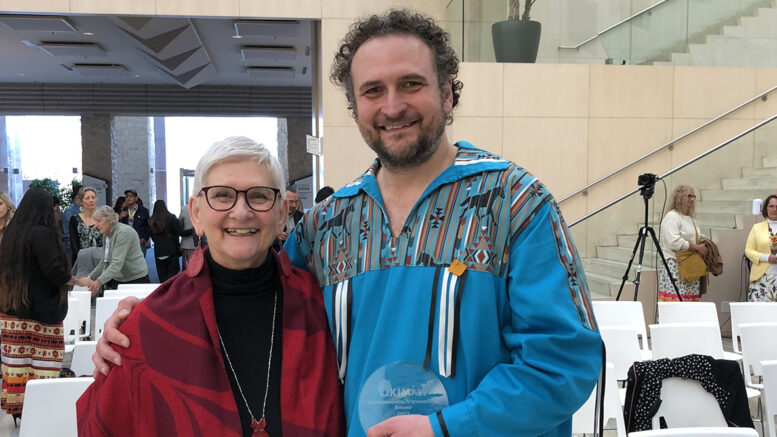By Laura Mushumanski, Local Journalism Initiative Reporter
(ANNews) – The longest journey a person will take in their lifetime is 18-inches – the journey from their head to their heart. This journey is as unique as the individual that is walking on this path, and at the same time it is a journey about humility. Along the way, there will be teachers of many kinds, walking with their own wisdom from their heart. In this case, what our Métis sister Victoria Gubbels has come to know about her own journey from her head to her heart – is the importance of connecting and bridging Indigenous and non-Indigenous peoples to learn about one another in a good way.
“When I moved to Regina, I got to meet with the Métis and First Nations communities and started to go to ceremony – that’s when my life changed,” shared Gubbels, current manager of the Indigenous Learning Initiatives with the Government of Alberta. “The Creator brought me to people and places to help me on this journey. My original plan was to teach English and Christian ethics in a Catholic high school. I ended up spending five years in the Sweat Lodge, going to Sundance, and having such incredible healing and experiences in the Sweat Lodge with my ancestors – it completely transformed me. And after 5 years, I realized the call of the Creator, that I had a calling and was asked to do the work that I am doing today.”
The importance of connecting and bridging Indigenous and non-Indigenous people for Gubbels began one day when her mother came home with a textbook that was being used in the Winnipeg school systems. It shared misinformation about Indigenous people and was being taught to children. Victoria’s mother was a strong advocate for Indigenous peoples, always encouraging her to get involved by sharing accurate information about Indigenous peoples and histories. This became a lifelong journey for her and sparked her passion for education.
“I have been gifted in the sweat lodge to do this work and to really be patient with people because if they don’t know, they don’t know,” shared Gubbels. She is passionate about educating learners. “My role is to provide learners with accurate information so that they know, but also to engage their heart. Because education without the heart is no education at all. If you want to transform people’s hearts and minds, and to do things differently, then you have to reach them at that heart level.”
Gubbels first started her journey, “after that cleansing in the Sweat Lodge, ‘the journey from my head to my heart.’ The doors opened with the Government of Saskatchewan, and I was hired to build partnerships beginning in the health sector between First Nations and Métis communities, government agencies, unions, and educational institutions – completely innovative partnership agreements to increase the hiring of Indigenous people in the health sector.” This led Victoria to invite everyone to the table, speaking to boards and unions across Saskatchewan about the importance of partnerships and preparing the workplace with Indigenous cultural training to support the retention of new Indigenous hires. The partnership approach led to language in collective agreements to educate health care staff and resulted in 32,000 healthcare workers receiving Indigenous training.
“This is a pathway of learning,” she said. “It is so amazing how we take somebody with passion and know they are committed. This is my responsibility to my ancestors; this is what my role is, to begin to educate people, to bridge that understanding of how we can come together to know one another’ like the Elders teach to build those good relations. So, we don’t have what we are facing today – the results and the impacts of oppressive policies of racism.”
Gubbels’ current role is leading Indigenous training for Alberta’s public servants, agencies, boards and commissions, on the myths and misconceptions of Indigenous peoples within Canada. The training is supported by Elders from across Alberta and facilitated by Indigenous facilitators teachings Indigeous history from an Indigenous perspective. The Elders teach that it is important that we always start in Ceremony. Therefore, Elders begin the training in Ceremony to provide a ‘safe space’ for participants to learn about our shared history and the history of residential schools which many have never heard about. Today, Gubbels is passionate about continuing this work of educating others based on the Elders teachings, their guidance and doing it in a good way – without blame, shame, or guilt about this shared history. She feels that in Alberta, we have one of the most innovative training programs in Canada because of the many diverse Elders that support and are involved in the training provided, “the truth path to reconciliation is through education.”
Gubbels continues to immerse herself into her work, gifting people the information that will help them make connections and build positive relations. To date there have been 20,500 participants across government that have taken this training. “My role is to honour all cultures by making sure everyone comes to the table and is included in our policies and in our systems and workforce,” she concludes. “We address every misinformation by opening peoples’ hearts and their minds.”



Dear Editor,
I truly appreciate your recognition of Victoria Gubbels and her remarkable contributions to Indigenous training.
Through her online courses, I have gained invaluable knowledge about my Métis heritage, and I am sure countless others have benefited from her expertise and passion.
Her commitment to fostering learning and mentorship has created a lasting legacy—one that will continue through the facilitators she has inspired and guided. The difference she has made in Indigenous education deserves to be celebrated.
Thank you for shining a light on Victoria’s incredible work.
Sincerely,
Lynne Ducharme
(Victoria’s Cousin)